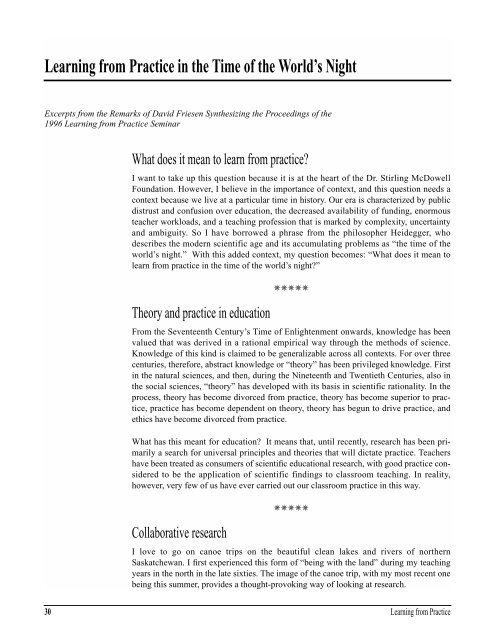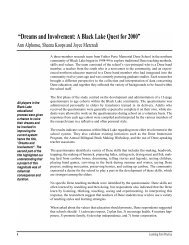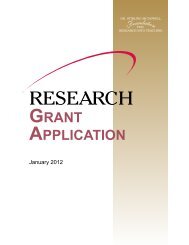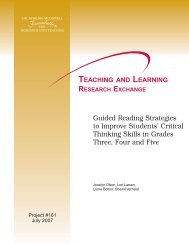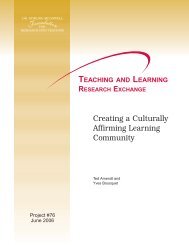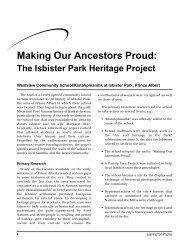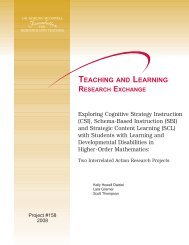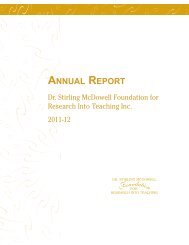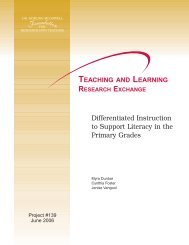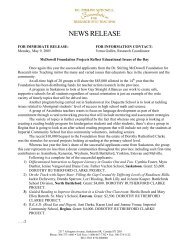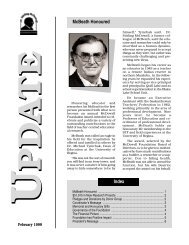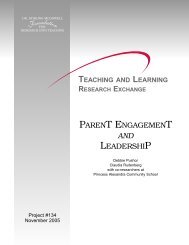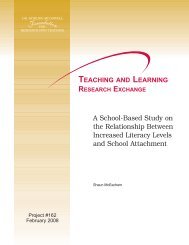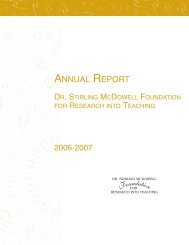Research Bulletin, Vol. 1, No. 2, 1996 - Dr. Stirling McDowell ...
Research Bulletin, Vol. 1, No. 2, 1996 - Dr. Stirling McDowell ...
Research Bulletin, Vol. 1, No. 2, 1996 - Dr. Stirling McDowell ...
You also want an ePaper? Increase the reach of your titles
YUMPU automatically turns print PDFs into web optimized ePapers that Google loves.
Learning from Practice in the Time of the World’s NightExcerpts from the Remarks of David Friesen Synthesizing the Proceedings of the<strong>1996</strong> Learning from Practice SeminarWhat does it mean to learn from practice?I want to take up this question because it is at the heart of the <strong>Dr</strong>. <strong>Stirling</strong> <strong>McDowell</strong>Foundation. However, I believe in the importance of context, and this question needs acontext because we live at a particular time in history. Our era is characterized by publicdistrust and confusion over education, the decreased availability of funding, enormousteacher workloads, and a teaching profession that is marked by complexity, uncertaintyand ambiguity. So I have borrowed a phrase from the philosopher Heidegger, whodescribes the modern scientific age and its accumulating problems as “the time of theworld’s night.” With this added context, my question becomes: “What does it mean tolearn from practice in the time of the world’s night?”Theory and practice in education✵✵✵✵✵From the Seventeenth Century’s Time of Enlightenment onwards, knowledge has beenvalued that was derived in a rational empirical way through the methods of science.Knowledge of this kind is claimed to be generalizable across all contexts. For over threecenturies, therefore, abstract knowledge or “theory” has been privileged knowledge. Firstin the natural sciences, and then, during the Nineteenth and Twentieth Centuries, also inthe social sciences, “theory” has developed with its basis in scientific rationality. In theprocess, theory has become divorced from practice, theory has become superior to practice,practice has become dependent on theory, theory has begun to drive practice, andethics have become divorced from practice.What has this meant for education? It means that, until recently, research has been primarilya search for universal principles and theories that will dictate practice. Teachershave been treated as consumers of scientific educational research, with good practice consideredto be the application of scientific findings to classroom teaching. In reality,however, very few of us have ever carried out our classroom practice in this way.Collaborative research✵✵✵✵✵I love to go on canoe trips on the beautiful clean lakes and rivers of northernSaskatchewan. I first experienced this form of “being with the land” during my teachingyears in the north in the late sixties. The image of the canoe trip, with my most recent onebeing this summer, provides a thought-provoking way of looking at research.30Learning from Practice


